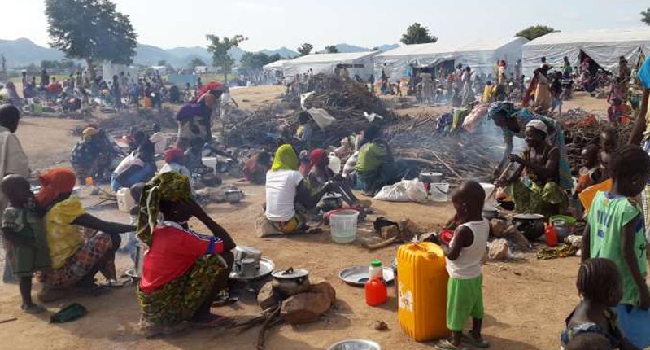News
Displaced by Boko Haram, Borno govt compounds sufferings of over 200,000 IDPs by shutting camps —HRW report

A detailed report by the Human Rights Watch has faulted the closure of Internally Displaced Persons’ (IDP) camps in Borno by the state government, positing that over 200,000 IDPs have been re-displaced and are suffering as a result of the closure.
Borno is the epicentre of the Boko Haram insurgency in Northeastern Nigeria. The insurgency has claimed over 35,000 lives and displaced over two million persons across the region since it started in 2009. According to Human Rights Watch, Borno State alone accounts for over 200,000 displaced persons.
The state government began the closure of IDP camps, on the premise that the security situation in the state had improved, as well as to advance its pledge to help displaced persons return to their communities.
However, the HRW found that there has been not much improvement in security in the state, nor did the government provide adequate interventions for the IDPs to return to their self-sustaining lives.
So far, eight camps have been shut down between May 2021 and August 2022, and the government already announced plans to shut down four more camps before the end of 2022.
The already closed camps include the Bakassi, Stadium, Teacher’s Village, Farm Center, Dalori I, Dalori II, Mogcolis, and National Youth Service Corps (NYSC) camps.
“The shutdowns have compelled displaced people to leave the camps without consultation, adequate information, or sustainable alternatives to ensure their safety and livelihoods in violation of Nigeria’s obligations under African regional law and international law on the rights of internally displaced persons,” HRW says.
READ ALSO:‘Your suffering in hands of terrorists, bandits, destined by God,’ Kebbi Gov. Bagudu, tells IDPs
The report, titled “Impact of Camp Shutdowns on People Displaced By Boko Haram Conflict in Nigeria”, contains the impact of the completed and impending shutdowns of the camps on the displaced population in Borno State. It says that many of the IDPs, who have now been re-displaced by the government’s decision, struggle to eat, meet basic needs and access adequate shelter after leaving the camps.
“Our research found that shutting down the camps has pushed many displaced people—who were already suffering from the conflict—deeper into destitution, leaving them struggling to eat, meet basic needs, or obtain adequate shelter.
“The planned shutdown of the remaining camps is already stoking anxiety among residents who fear similar harms absent significant changes in the authorities’ approach to the situation.”
It was stated that many IDPs who have been sacked from the eight camps are living in informal camps without regular aid from the government and humanitarian agencies, while others who have returned to their houses struggle to survive as it is still not safe for them to return to their farmlands.
The HRW added that in the four camps that are still open, agencies including the World Food Programme (WFP) and the Borno State Emergency Management Authority (SEMA) had stopped providing monthly food rations and cash transfers for food. “This followed the state government’s pronouncement in October 2021 that the camps were set to be shut down by the end of that year.”
The reduction in aid supplies has subjected many IDPs to severe hunger and uncertainty.
The HRW called on the Nigerian federal government to “urgently engage with the Borno State government to halt further camp closures, and both governments should work together with the UN, donor governments, and humanitarian agencies to ensure that plans to return or resettle displaced persons do not violate their rights. They should also remove restrictions on aid and ensure that humanitarian organizations can provide lifesaving assistance in displacement camps and all areas where needs are identified.”
Join the conversation
Support Ripples Nigeria, hold up solutions journalism
Balanced, fearless journalism driven by data comes at huge financial costs.
As a media platform, we hold leadership accountable and will not trade the right to press freedom and free speech for a piece of cake.
If you like what we do, and are ready to uphold solutions journalism, kindly donate to the Ripples Nigeria cause.
Your support would help to ensure that citizens and institutions continue to have free access to credible and reliable information for societal development.
























